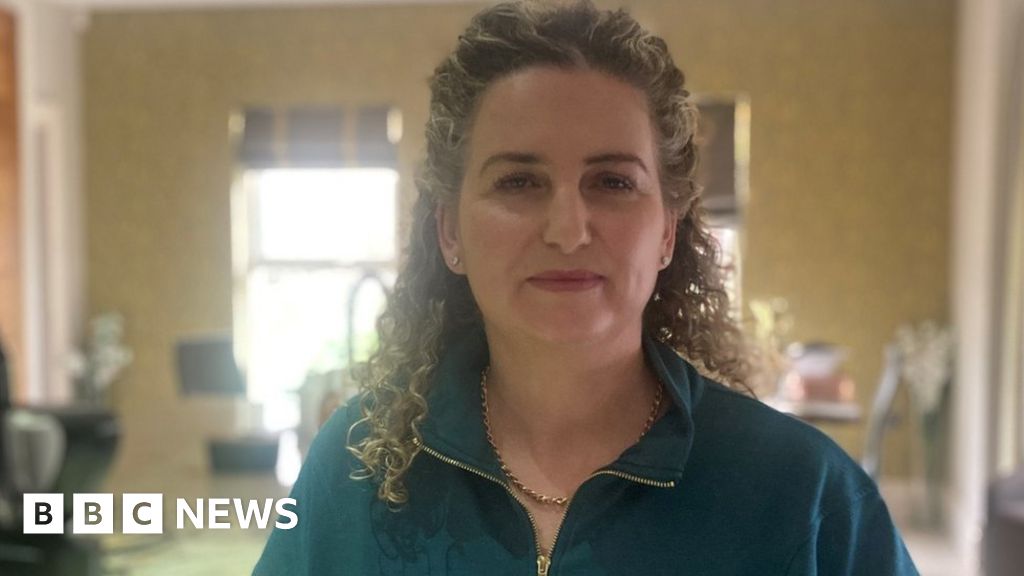- By Marie-Louise Connolly
- BBC News NI health correspondent
Anne Donnelly was diagnosed with endometriosis at the age of 22
Women waiting too long for NHS gynaecological treatments end up having potentially avoidable major surgery, a retired teacher has said.
Anne Donnelly, 43, had an operation for endometriosis two years ago and is awaiting physiotherapy.
A major review of gynae services said health trusts need to re-prioritise those waiting over a year for surgery.
The Department of Health said the report recognised “unacceptably high” waiting times.
It added that the department would work to progress the recommendations, but that some will require “additional investment” which could impact delivery.
‘Debilitating pain restricted my life’
The review found that more than 37,000 women were on hospital waiting lists in Northern Ireland with 5% of those waiting nearly three years for treatment.
Anne Donnelly, from County Tyrone, was diagnosed with endometriosis at the age of 22, after years of attending various GPs, specialists and a psychologist.
“I went from being a bubbly, active, outgoing 15-year-old to overnight having a debilitating pain that restricted my life and eventually led to me abandoning sport and Irish dancing. Endometriosis takes over every part of your life.
“It is excruciatingly painful, it is like someone is sticking a knife into you; it takes the breath from you. I’m still shocked that we have to fight seven, eight, nine, 10 years before we are taken seriously,” Anne said.
She said women feel “abandoned” by the NHS, with some having their bowels or womb removed as disease, such as hers, spreads.
Image source, SDI Productions
Northern Ireland has the longest gynaecological waiting lists in the UK
The review of gynaecology was conducted by the Getting it Right First Time (GIRFT) team, an external organisation on behalf of the NHS.
The team spent a week last year visiting the five Northern Ireland health and social care trusts.
Dysmenorrhoea, endometriosis, incontinence, hysterectomy, prolapse and urinary tract infections are among the conditions covered by gynae services.
- The Department of Health should promote a single trust gynaecological patient tracking list.
- All five health trusts should “urgently develop an improvement strategy” for waiting lists.
- Planned surgery must become “resilient” so it does not “shut down” during the winter months.
- Outpatient procedures and day case gynae surgery should be focussed at Mater, Lagan Valley, Daisy Hill, Causeway, Omagh and South West Acute (SWAH) hospitals.
The review recommends the creation of a gynaecological hub in each trust, including at the South West Acute Hospital in Enniskillen
What have the trusts to do?
The review makes recommendation for each health trust.
It said Belfast should “urgently develop an improvement strategy to address the outpatient and surgical waiting lists and include the introduction of a surgical robotic programme, similar to what exists in England”.
It added that an action plan should be developed within one month of receiving the report.
The Southern Health Trust was advised to open a dedicated female surgical ward for gynaecology, breast, and female urology patients with a minimum of two protected beds for each specialty.
In relation to the Northern Trust, the report suggested promoting the Causeway Hospital’s gynaecology unit as the main elective day case hub.
There were 17 recommendations for the Western Trust, including creating a dedicated gynaecology/women’s health unit and to commission an abortion MVA service.
It also noted action was needed to resolve the “issue of Swah consultants leaving” for the Southern Trust.
In the South Eastern Trust, the suggestions included a need to develop Rapid Access Gynaecology Clinic for 10 sessions per week.
What of maternity services?
The report suggested a similar consideration be made to maternity services at Swah and Daisy Hill, where “a similar move to centralise services would free up clinical time and space for other elective women’s services”.
Anne Donnelly is now awaiting an MRI and physiotherapy treatment.
She said in the past 30 years, little has changed around gynaecological services.
Like most women in her position, she was told that painful periods were “normal”.
“We are ignored and it’s not good enough anymore, I am still facing the same discrimination because I am a woman, I am still facing the same comments about periods and endometriosis,” Anne said.
“How can a young woman, at 43 with three kids, a teacher be left abandoned by the NHS and the government because we didn’t have a government or leaders making decisions?” she said.

Sarah Carter is a health and wellness expert residing in the UK. With a background in healthcare, she offers evidence-based advice on fitness, nutrition, and mental well-being, promoting healthier living for readers.








